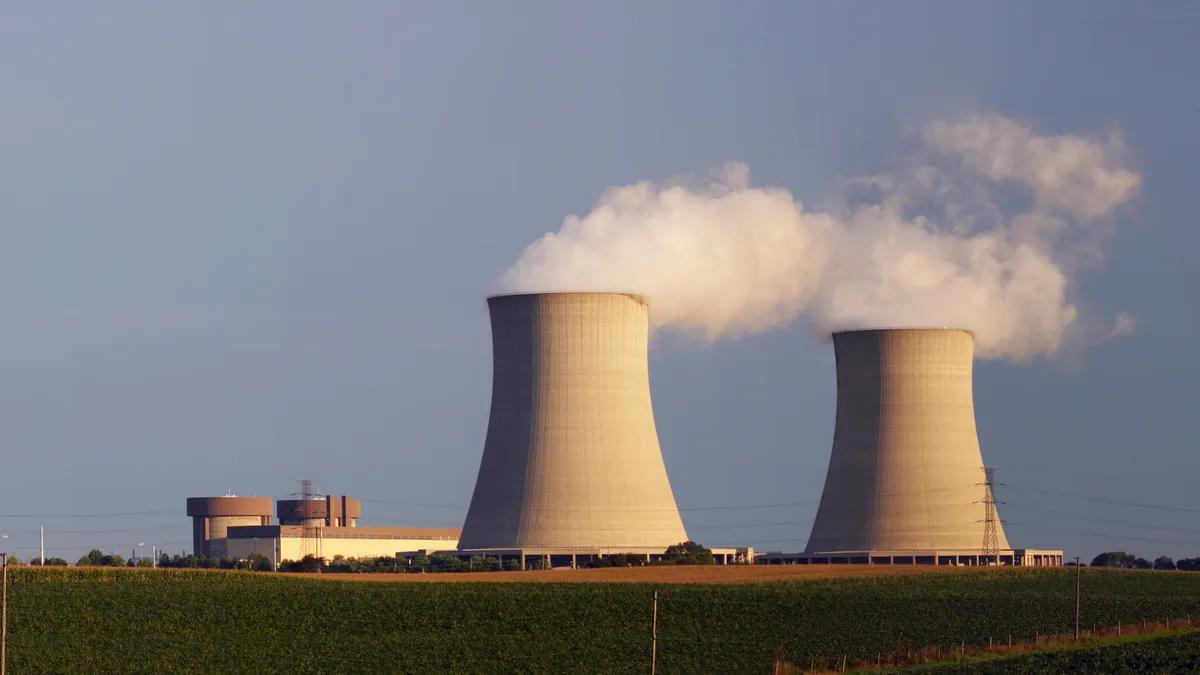Dive Brief:
- Achieving the same amount of zero emissions power through renewables and storage would be 12 times more expensive than continuing to run Illinois' nuclear plants and cost the state's consumers $80 billion, Exelon CEO Chris Crane said during the company's Q1 earnings call on Wednesday.
- State and federal officials are exploring ways to keep nuclear plants open as they are considered a key part of any plan to decarbonize the power sector. However, a proposal from Illinois Gov. J.B. Pritzker, D, to support Exelon's Byron and Dresden plants, is "not adequate," Crane said.
- Crane dismissed the prospect that federal legislation could pass in time to prevent the closure of the Byron and Dresden plants, expressing more optimism in a state solution. "We're confident that we've got adequate support within the administration and within the legislature, and we'll see how it goes," he said.
Dive Insight:
Nuclear plants have been buffeted by increasing competition from natural gas and renewables. At the same time, they provide a significant amount of the zero emissions power in the U.S. and would be a key part of any plan to achieve President Joe Biden's climate goals.
"Nuclear provides more than half of the carbon-free emission electricity in the U.S., with Exelon plants providing 12% of all the carbon-free energy in the United States," Crane said on Wednesday's call, pointing to Biden's 2030 goal of reducing economy-wide greenhouse gas emissions 50% to 52% below 2005 levels by 2030.
Absent more support, Exelon plans to shut down its Dresden and Byron plants, with a combined capacity of about 4.3 GW, this year.
"Current market prices do not allow us to continue to meet our payroll, paying our property taxes, and covering other significant costs and risks of operating these assets. Without adequate policy ... we will retire uneconomic plants beginning this fall," Crane said.
In announcing the shutdowns last August, Exelon pointed to both declining energy prices and market rules that it said gave a competitive advantage to polluting sources bidding into PJM's capacity market. PJM and its member states are exploring alternatives to the current rules that are more in line with broader climate policy goals.
Exelon's assertions regarding the poor economics of its Byron and Dresden plants were backed up in a study released last month by Synapse Energy Economics, which had been hired by the Pritzker administration to investigate Exelon's claims.
"Byron and Dresden do face real risk of becoming uneconomic in the near term," Synapse said in its report, which recommended state financial support for the plants.
But Pritzker's proposal to support the plants is insufficient and based on questionable estimates, according to Exelon spokespserson Paul Adams.
"The minimal level of support offered by the governor’s proposal was based on estimates prepared by a consultant whose work has twice been rejected by New Jersey policymakers, who when faced with the same circumstances concluded that saving that state’s nuclear plants would cost consumers far less than trying to replace them with other clean energy sources," Adams said via email.
But the Union of Concerned Scientists disputed Crane's remarks regarding the cost of replacing nuclear with renewables and storage in Illinois.
"Crane’s comment that renewables plus storage would cost 12 [times] or $80 billion more than keeping the existing nuke plants running is ridiculous. I’m guessing he’s comparing the incremental cost of keeping them running (basically the subsidies) to the all-in cost of adding new renewables plus storage and the tax credits," said Steve Clemmer, director of energy research for the UCS Climate and Energy Program.
A 2020 report from Lawrence Berkeley National Laboratory shows solar+battery PPA prices declining to around $25-30/MWH in 2019 including the ITC, which is similar to the operating costs of most existing nuclear plants as shown in a 2020 NEI report, he added.
In addition to the governor's proposal, several other energy policy reform bills have been introduced in Illinois to drive the state's energy transition and tackle climate change. Legislative leaders are meeting to develop a package from the various bills that can be considered this session, Crane said during Wednesday's call, adding that Exelon was "encouraged" by the expression of support for the continued operation of the nuclear plants.
"However, the details really matter. A bill needs to pass before the end of the regular session, and it needs to provide adequate support for continuing to invest in the Illinois fleet," he continued.
Crane also pointed to an April 27 decision by New Jersey regulators to extend subsidies for two of PSE&G's nuclear plants.
"The same voices that are arguing in Illinois that our plants are profitable were overruled in New Jersey's decision. The commission in New Jersey emphasized that maintaining the existing nuclear plants was critical to achieving the state's emission goals and significantly less costly than replacing nuclear with other [carbon free] generation. This is true in Illinois. Keeping the nuclear plants running is better option for the customers than trying to replace them with all renewables in storage," he said.















